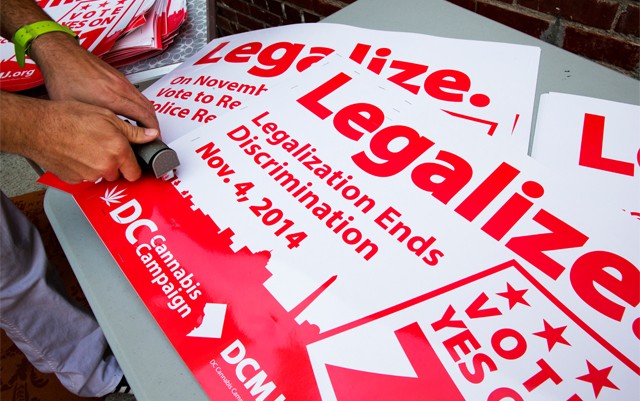After years of a failed war on drugs, more and more people are coming to the realization that something needs to be done – prohibition just doesn’t work. The District of Columbia (Washington D.C.) was one of the places to decide enough was enough.
Last Friday was the anniversary of the implementation of Initiative 71 in D.C., which legalized the possession of up to two ounces of marijuana and the personal cultivation of up to six plants. This ballot initiative was widely supported by legalization activists, faith leaders, civil rights activists, and many more – it passed with a landslide 70% vote.
The intention behind the initiative was not just to end marijuana prohibition, but to bring an end to the unjust targeting of the racial communities. It is well known in the District that law enforcement has always been biased – proven by the fact that African Americans were eight times more likely to be arrested for marijuana possession than Caucasians – even though it has been proven that marijuana use is pretty much at the same percentage among every race.
Marijuana possession arrests in 2014, prior to the implementation of the 2014 measure, were at 1,840. In 2015 that number dropped astoundingly to only 32 individuals, a 98% decrease. Overall arrests related to marijuana dropped a total of 85% last year. This means potentially thousands of people have been spared the life changing event of being arrested for marijuana thanks to this law.
“The decrease in marijuana arrests is an enormous victory for District residents, who have resoundingly rejected the criminalization of marijuana,” said Bill Piper, Senior Director of National Affairs for the Drug Policy Alliance. “Marijuana law enforcement has particularly damaged communities of color in the District, who have borne the brunt of prohibition. We hope that law enforcement continues to responsibly enforce the new law and completely eliminates any racial disparity in arrests.”
There is still a long way to go for D.C. to be up to the same speed as say Colorado or any of the four states to legalize. After all, they were able to legalize possession of the plant and cultivation – but the District does not allow voter initiatives to tax or spend – which has left a regulated market with taxed sales off the table for now. However, if they were to set up a system with already existing funds, then the tax revenue could be substantial.
So much could be accomplished to help build this community back up if they chose to regulate and tax marijuana sales. It would boost their economy – no matter how small of an area it is. Tax revenue could be used for treatment programs, education and prevention programs for youth and they could even help those who were negatively impacted by prohibition.
Congrats on your one full year of legalization D.C. – I hope to see even more progress over the next few years!






